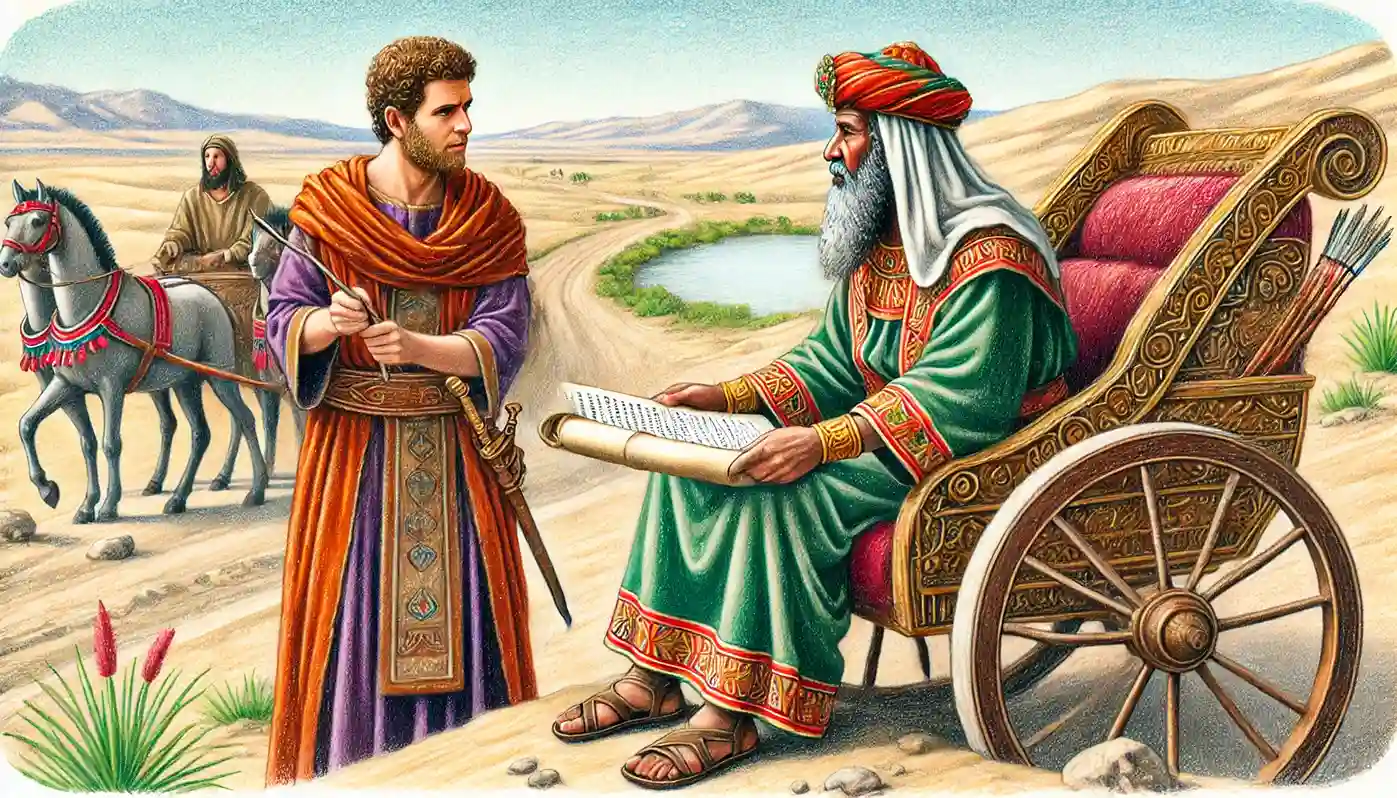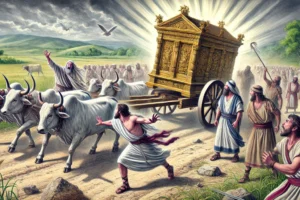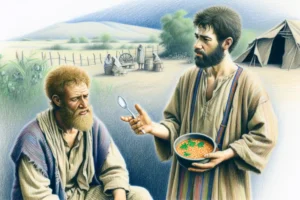
Philip the Evangelist and the Ethiopian Eunuch
Philip the Evangelist’s encounter with the Ethiopian eunuch is a significant event in the early Christian church, illustrating divine guidance and the spread of the gospel beyond Jewish boundaries.
- Philip’s Mission: Philip the Evangelist was one of the seven deacons chosen to serve in the early church (Acts 6:5).
- Divine Direction: An angel of the Lord directed Philip to go south to the road that goes down from Jerusalem to Gaza (Acts 8:26).
- The Ethiopian Eunuch: The eunuch was an important official in charge of all the treasury of the Kandake (queen) of the Ethiopians (Acts 8:27).
- Reading Isaiah: The eunuch was reading a passage from the Book of Isaiah, specifically Isaiah 53, concerning the suffering servant (Acts 8:28-33).
- Philip’s Explanation: Philip explained that the scripture was about Jesus Christ, the suffering Messiah (Acts 8:34-35).
- Baptism: Upon coming to a body of water, the eunuch asked to be baptized, and Philip baptized him (Acts 8:36-38).
- Spirit’s Work: After the baptism, the Spirit of the Lord took Philip away, and the eunuch continued on his way rejoicing (Acts 8:39).
The account of Philip the Evangelist and the Ethiopian eunuch in Acts 8:26-39 is a significant event in the early Christian church, reflecting divine guidance and the gospel’s inclusive reach.
Context and Background:
- Philip’s Role: Philip, one of the seven deacons chosen in Acts 6:5, was actively involved in spreading the gospel. Known for his evangelistic work, Philip played a crucial role in the early church’s mission.
- Divine Guidance: The narrative begins with an angel of the Lord instructing Philip to travel south to the desert road from Jerusalem to Gaza. This highlights God’s sovereignty and active involvement in directing His servants for specific purposes (Acts 8:26).
The Ethiopian Eunuch:
- High-Ranking Official: The eunuch was a significant figure, in charge of all the treasury of Candace, queen of the Ethiopians. This detail underscores the reach of the gospel to influential and diverse individuals (Acts 8:27).
- Spiritual Hunger: The eunuch’s dedication to reading Isaiah during his journey reflects his spiritual seeking. His position and wealth did not fulfill his spiritual needs, driving him to seek understanding through scripture.
Encounter and Explanation:
- Reading Isaiah: The eunuch was reading from Isaiah 53, a passage about the suffering servant. This prophecy is central to understanding Jesus’ role as the Messiah who suffers and dies for humanity’s sins (Acts 8:28-33).
- Philip’s Approach: Philip’s approach was respectful and inquisitive, asking if the eunuch understood the passage. This opened a conversation that led to Philip explaining how the prophecy pointed to Jesus (Acts 8:30-35).
Baptism and Conversion:
- Immediate Response: The eunuch’s immediate desire to be baptized upon finding water signifies his genuine acceptance of the gospel. His request, “What can stand in the way of my being baptized?” shows his eagerness to fully embrace his newfound faith (Acts 8:36-38).
- Spirit’s Intervention: After the baptism, the Spirit of the Lord suddenly took Philip away. This miraculous event left the eunuch rejoicing, emphasizing the joy and transformation that accompanies genuine conversion (Acts 8:39).
Theological Insights:
- Fulfillment of Prophecy: The passage from Isaiah 53 that the eunuch was reading is crucial in Christian theology. It depicts the suffering servant, interpreted by Christians as a prophecy about Jesus’ sacrificial death. Philip’s explanation connects Old Testament prophecy with the New Testament revelation of Christ.
- Inclusivity of the Gospel: The encounter demonstrates the inclusivity of the gospel. The eunuch, a Gentile and a eunuch (a status often marginalized in Jewish society), was fully accepted into the Christian faith. This event prefigures the broader mission to the Gentiles and the universal reach of the gospel.
- Role of the Holy Spirit: The narrative highlights the Holy Spirit’s role in guiding evangelistic efforts. From directing Philip to the precise moment of the encounter, the Spirit orchestrates the spread of the gospel, ensuring its reach to diverse and significant individuals.
Conclusion:
The story of Philip and the Ethiopian eunuch is a powerful example of God’s active involvement in evangelism, the fulfillment of scriptural prophecy, and the transformative power of the gospel. It underscores the importance of being attuned to divine guidance, the need for scripture-based evangelism, and the joy that accompanies conversion. This narrative also marks a pivotal moment in the early church’s mission, demonstrating that the message of Christ transcends cultural and social boundaries, reaching all who are seeking truth.



